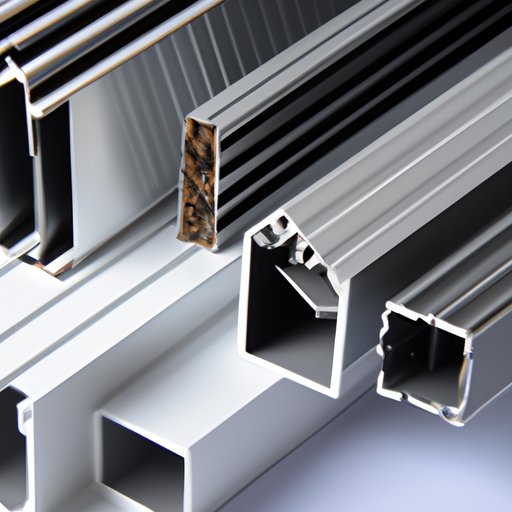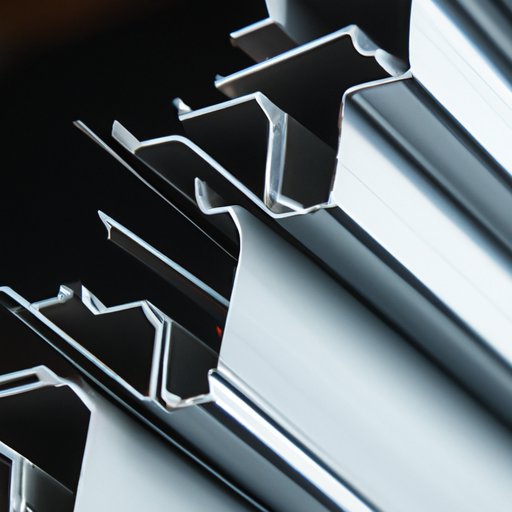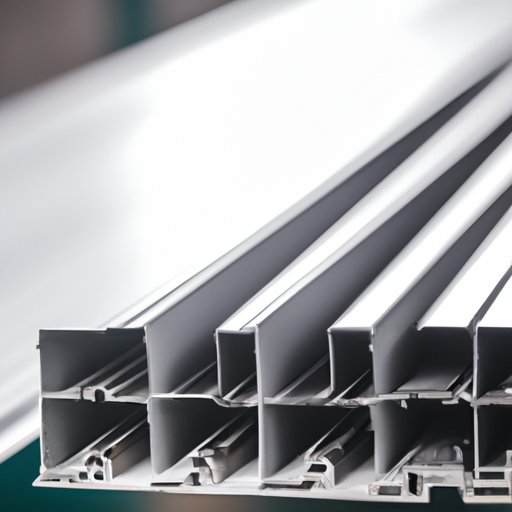Content Menu
● Understanding Aluminum Extrusion
>> Benefits of Aluminum Extrusion
● Steps to Find a Reliable Aluminum Extrusion Supplier
>> Define Your Requirements
>> Conduct Online Research
>> Check Industry Directories
>> Ask for Recommendations
>> Evaluate Supplier Capabilities
>> Request Samples
>> Compare Pricing
>> Assess Customer Service
>> Visit the Supplier's Facility
>> Establish a Relationship
● Additional Considerations When Choosing a Supplier
>> Quality Assurance
>> Technical Support
>> Lead Times and Flexibility
>> Sustainability Practices
>> Long-Term Partnership Potential
● Conclusion
● Frequently Asked Questions
>> 1. What is aluminum extrusion?
>> 2. What are the benefits of using aluminum extrusions?
>> 3. How do I know if a supplier is reliable?
>> 4. Can I request custom aluminum extrusion profiles?
>> 5. What factors affect the cost of aluminum extrusions?
Finding a reliable aluminum extrusion supplier can be a daunting task, especially if you are new to the industry or are looking for specific requirements. Aluminum extrusion is a manufacturing process that shapes aluminum alloy into a desired cross-sectional profile. This process is widely used in various industries, including construction, automotive, aerospace, and consumer goods. In this article, we will explore the steps to find a reliable aluminum extrusion supplier, the factors to consider, and tips for ensuring a successful partnership.

Understanding Aluminum Extrusion
Before diving into how to find a supplier, it's essential to understand what aluminum extrusion is and why it is beneficial. The extrusion process involves forcing aluminum alloy through a die to create a specific shape. This method allows for the production of complex shapes that are lightweight yet strong, making aluminum an ideal material for many applications.
Benefits of Aluminum Extrusion
1. Versatility: Aluminum can be extruded into a wide range of shapes and sizes, making it suitable for various applications.
2. Lightweight: Aluminum is significantly lighter than steel, which can reduce transportation costs and improve energy efficiency.
3. Corrosion Resistance: Aluminum naturally forms a protective oxide layer, making it resistant to corrosion.
4. Recyclability: Aluminum is 100% recyclable without losing its properties, making it an environmentally friendly choice.
Steps to Find a Reliable Aluminum Extrusion Supplier
Define Your Requirements
Before searching for a supplier, clearly define your requirements. Consider the following:
- Material Specifications: What type of aluminum alloy do you need? Different alloys have different properties.
- Profile Design: Do you have a specific design in mind? Providing detailed drawings can help suppliers understand your needs.
- Quantity: How many extrusions do you need? Some suppliers may have minimum order quantities.
- Lead Time: When do you need the extrusions? Ensure the supplier can meet your timeline.
Conduct Online Research
Start your search by conducting online research. Use search engines to find aluminum extrusion suppliers in your area. Look for suppliers that specialize in your required materials and profiles. Pay attention to their websites, as they often provide valuable information about their capabilities, services, and product offerings.
Check Industry Directories
Industry directories can be a valuable resource for finding suppliers. Websites like ThomasNet, Alibaba, and industry-specific directories list manufacturers and suppliers of aluminum extrusions. These directories often include customer reviews and ratings, which can help you gauge the reliability of a supplier.
Ask for Recommendations
Reach out to your network for recommendations. Colleagues, industry contacts, or trade associations may have experience with aluminum extrusion suppliers and can provide valuable insights. Personal recommendations can often lead to finding trustworthy suppliers.
Evaluate Supplier Capabilities
Once you have a list of potential suppliers, evaluate their capabilities. Consider the following factors:
- Experience: How long has the supplier been in business? Experienced suppliers are more likely to understand the nuances of aluminum extrusion.
- Certifications: Check if the supplier has relevant certifications, such as ISO 9001, which indicates a commitment to quality management.
- Production Capacity: Ensure the supplier can handle your order size and has the necessary equipment for your specific requirements.
Request Samples
Before making a final decision, request samples of the aluminum extrusions. This allows you to assess the quality of the supplier's work. Examine the samples for dimensional accuracy, surface finish, and overall quality. If possible, conduct tests to ensure the material meets your specifications.

Compare Pricing
Pricing is an essential factor in choosing a supplier. Request quotes from multiple suppliers and compare them. However, be cautious of prices that seem too good to be true, as they may indicate lower quality or hidden costs. Consider the overall value, including quality, service, and delivery times, rather than just the price.
Assess Customer Service
Good customer service is crucial for a successful partnership. Evaluate how responsive and helpful the supplier is during your initial interactions. A supplier that communicates effectively and addresses your concerns is more likely to provide a positive experience throughout the project.
Visit the Supplier's Facility
If possible, visit the supplier's facility. This allows you to see their operations firsthand and assess their capabilities. During the visit, observe the cleanliness of the facility, the condition of the equipment, and the professionalism of the staff. A well-maintained facility is often a good indicator of a reliable supplier.
Establish a Relationship
Once you have selected a supplier, work on establishing a strong relationship. Clear communication and collaboration can lead to better results and a more successful partnership. Discuss your expectations, timelines, and any potential challenges upfront to ensure everyone is on the same page.
Additional Considerations When Choosing a Supplier
Quality Assurance
Quality assurance is a critical aspect of the aluminum extrusion process. Ensure that the supplier has a robust quality control system in place. This may include regular inspections, testing of materials, and adherence to industry standards. A supplier that prioritizes quality will help you avoid costly mistakes and ensure that the extrusions meet your specifications.
Technical Support
Consider whether the supplier offers technical support. This can be invaluable, especially if you encounter challenges during the design or manufacturing process. A supplier with knowledgeable staff can provide guidance on material selection, design optimization, and troubleshooting.
Lead Times and Flexibility
In today's fast-paced market, lead times are crucial. Discuss the supplier's typical lead times and their ability to accommodate rush orders. Flexibility in production schedules can be a significant advantage, especially if your project timelines are tight.
Sustainability Practices
As sustainability becomes increasingly important, consider the supplier's environmental practices. Many aluminum suppliers are adopting sustainable practices, such as using recycled materials and minimizing waste. Partnering with a supplier that prioritizes sustainability can enhance your brand's reputation and contribute to environmental conservation.
Long-Term Partnership Potential
Finally, think about the potential for a long-term partnership. A reliable supplier can become a valuable ally in your business. Look for a supplier that is willing to grow with you, adapt to your changing needs, and provide ongoing support.
Conclusion
Finding a reliable aluminum extrusion supplier requires careful research and consideration. By defining your requirements, conducting thorough research, and evaluating potential suppliers, you can ensure a successful partnership that meets your needs. Remember to prioritize quality, communication, and customer service throughout the process.

Frequently Asked Questions
1. What is aluminum extrusion?
Aluminum extrusion is a manufacturing process that shapes aluminum alloy into a desired cross-sectional profile by forcing it through a die. This process allows for the creation of complex shapes that are lightweight and strong.
2. What are the benefits of using aluminum extrusions?
Aluminum extrusions are lightweight, corrosion-resistant, versatile, and recyclable, making them ideal for various applications across multiple industries.
3. How do I know if a supplier is reliable?
To assess a supplier's reliability, look for their experience, certifications, production capacity, customer reviews, and effective communication during your initial interactions.
4. Can I request custom aluminum extrusion profiles?
Yes, many suppliers offer custom aluminum extrusion services to meet specific design requirements. Providing detailed drawings and specifications will help suppliers understand your needs.
5. What factors affect the cost of aluminum extrusions?
Factors that influence the cost of aluminum extrusions include material specifications, profile complexity, order quantity, production lead times, and the supplier's pricing structure.
By following these guidelines and considering the factors outlined in this article, you can successfully navigate the process of finding a reliable aluminum extrusion supplier that meets your specific needs.






















